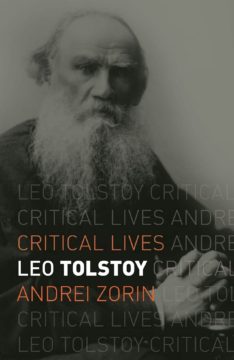Maria Rubin in The NY Review of Books:
 IT IS DAUNTING to write a biography of Tolstoy. Hundreds or even thousands of books have already put each detail of his life and work under a microscope, and the archives contain no more hidden treasures. Yet, new interpretations of Tolstoy’s life continue to pour in, with more expected in the run-up to the writer’s 200th birthday in 2028. One of the most immediately obvious advantages of Andrei Zorin’s Leo Tolstoy is its brevity. And I don’t mean this as a backhanded compliment. While other biographies tend to compete with the author’s greatest novels in length, this medium-format book of roughly 200 pages will be welcomed by those who want to learn more about the legendary Russian writer without a major time commitment.
IT IS DAUNTING to write a biography of Tolstoy. Hundreds or even thousands of books have already put each detail of his life and work under a microscope, and the archives contain no more hidden treasures. Yet, new interpretations of Tolstoy’s life continue to pour in, with more expected in the run-up to the writer’s 200th birthday in 2028. One of the most immediately obvious advantages of Andrei Zorin’s Leo Tolstoy is its brevity. And I don’t mean this as a backhanded compliment. While other biographies tend to compete with the author’s greatest novels in length, this medium-format book of roughly 200 pages will be welcomed by those who want to learn more about the legendary Russian writer without a major time commitment.
Zorin’s book achieves the ultimate expectation set by the biography genre — he creates a consistent representation of Tolstoy’s integral personality. To begin with, he does not revisit the familiar dichotomy of Tolstoy the artist versus Tolstoy the thinker. According to this narrative, the writer turned to excessive moralizing after completing War and Peace and Anna Karenina, gradually suffocating his artistic genius. In the colorful words of Tatyana Tolstaya, the writer’s distant descendent and a popular author in her own right, once he turned to preaching the “quill fell out of his hand.” Tolstoy himself was very much aware of this inner conflict and in later life “resolved” it by condemning much of European art and literature, his own fiction included. Whereas many scholars have been all too eager to assimilate this binary paradigm, Zorin writes his biography against that trend. He presents Tolstoy as a sum total of all of his various activities — fiction, nonfiction, correspondence, oral teachings, religious writings, direct action, and even family squabbles — seamlessly integrated into the text of his life. While Tolstoy’s path seems full of unexpected shifts from one extreme to the other (from a dissolute lifestyle to near-chastity, from hunting to vegetarianism, from fiction to preaching, from luxury to asceticism), Zorin’s book shows that every juncture was just another manifestation of the inner logic of his existence. In this light, the spiritual crisis of 1878, when Tolstoy appeared to have rejected nearly all of his former values, was nothing sudden: this “conversion” became a culmination of a lifelong quest for the meaning of life and death, deep self-reflection and religious skepticism.
More here.
